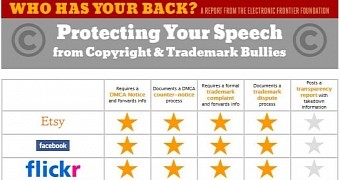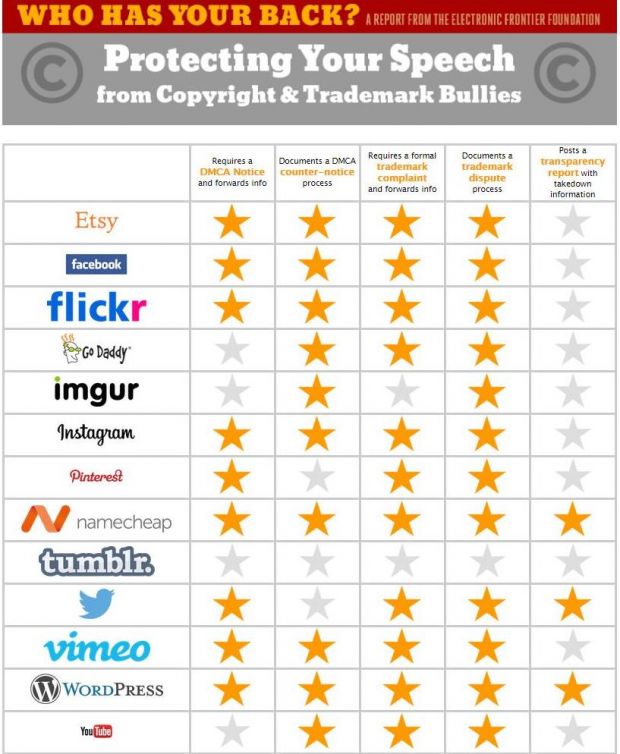The Electronic Frontier puts together several annual reports regarding the tech companies that have the users’ backs. One of these reports regards how these tech giants treat people’s privacy, while another regards protecting their rights to free speech in front of copyright and trademark bullies.
“When somebody wants to silence speech, they often use the quickest method available. When the speech is hosted on a major online platform, that method is usually a copyright or trademark complaint. For many years, EFF has worked with people whose lawful speech has been unfairly targeted by these sorts of complaints. We've observed that some approaches tend to work better than others in preventing that sort of deliberate abuse, as well as the casual censorship that comes from haphazard and dragnet approaches to policing online infringement,” the EFF starts off.
The EFF looks into five different things and awards companies a star for each criterion it meets. For instance, does the service require a DMCA notice and forwards info? Does it document a DMCA counter-notice process and requires a formal trademark complaint? Does it document trademark dispute processes and posts transparency reports with takedown information data?
The only two companies to get five out of five stars are Namecheap, an ICANN-accredited domain registrar and web hosting company, and WordPress, the world’s most popular blogging platform. Namecheap claims it has over 800,000 customers and handles some 3 million domains, while WordPress was used by more than 22 percent of the top 10 million websites as of August 2013.
Who missed the top?
There’s a good part of the list that scored four stars, but the only company to get a star for putting it all in a transparency report is Twitter, a company that lost the chance to join the “five-star-group” because it doesn’t document DMCA counter-notice processes.
Others that have scored four stars for standing up for their users’ rights in front of copyright and trademark bullies are Etsy, Facebook, Flickr, Instagram and Vimeo.
GoDaddy only got three stars because it doesn’t require DMCA notices or posts transparency reports. Pinterest, on the other hand, misses out on the transparency report and doesn’t document DMCA counter-notice processes. YouTube, on the other hand, doesn’t require a DMCA notice or builds a transparency report.
Photo sharing service Imgur only scored two stars, for documenting DMCA counter-notice processes and trademark disputes. Tumblr, Yahoo’s big purchase from last year, didn’t get any stars.
“Major online platforms have become the hubs for so much of our speech. The result is that their policy decisions can have an outsized impact on what speech enters the public discourse, and what gets silenced or relegated to secondary status. As users choose which platforms will host their updates, writing, images, and videos, they ought to know which of these services have made explicit commitments to defend that speech against bullies that would try to take it down,” the EFF notes, explaining why it has chosen to put together this new list.
The stars were rewarded based on objectively verifiable, public policy statements. When such a statement is nowhere to be found, no stars were awarded, while the same strategy was applied when companies were found to act differently than their policies state.

 14 DAY TRIAL //
14 DAY TRIAL // 